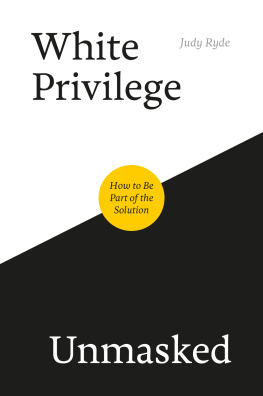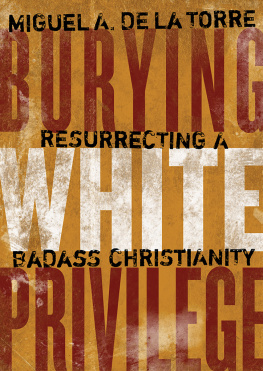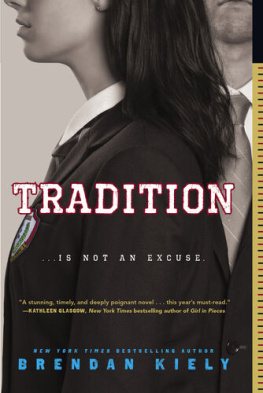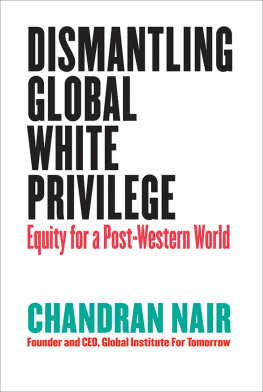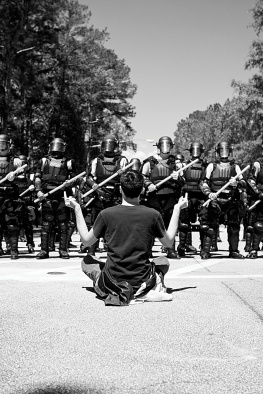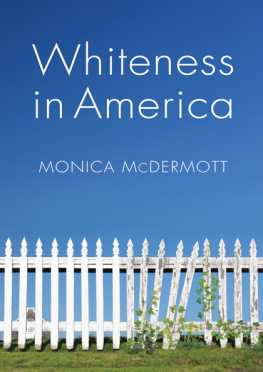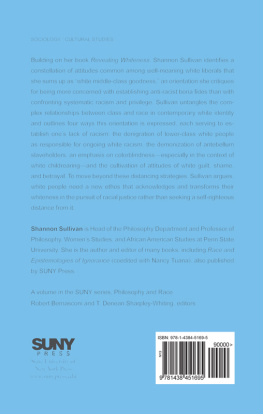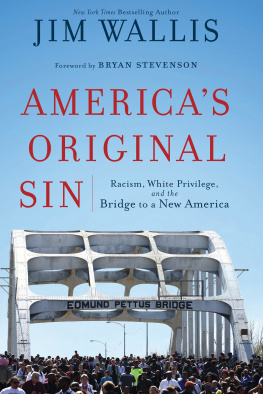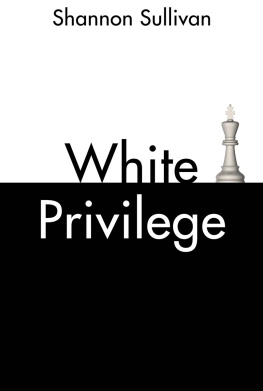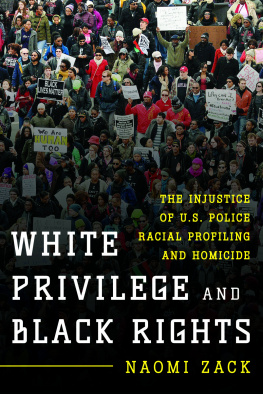
WHITE PRIVILEGE
UNMASKED
.........................
How to Be Part of the Solution
.........................
Judy Ryde

Jessica Kingsley Publishers
London and Philadelphia
Contents
PART 1
.......................
FACING UP TO
WHITE PRIVILEGE
.......................
CHAPTER 1
Introduction
W e live in a world that is imbued with the idea that the human population is divided into races (Irvin Painter, 2010:119; Kendi, 2016:18). This may not always be obvious, particularly if we are white and live mostly among white people. White people do not usually think of themselves as having a race, but in this book, I will challenge the attitude, often held by white people, that they are racially and culturally neutral (Dyer, 1997; Frankenberg, 1999; Kincheloe & Steinberg, 1998). We live within a racialised world, in other words, one in which all are divided into different races (Bonnett, 2000). Although originally thought to have a biological basis (Mahoney, 1997), this has been thoroughly discredited. Nevertheless, race is still very much a powerful social construct that influences the way we relate to others.
This book has many challenges to white people. I challenge the idea that white people are without a race, that our political arrangements are superior to others, that we have liberal-minded and fair societies, that past injustices are in the past and that we, on the whole, have been a net positive for the world, particularly as our technologies have actually brought the world to the possibility of extinction. This hard-hitting quote from Susan Sontag, written as long ago as 1967, puts this very well:
The truth is that Mozart, Pascal, Boolean and Algebra, Shakespeare, Parliamentary Democracy, Baroque Churches, Newton, the emancipation of women, Kant, Marx, Balanchine ballets et al. , dont redeem what this particular civilization has wrought upon the world. The white races are the cancer of human history; it is the white race and it alone its ideologies and inventions which eradicates autonomous civilizations wherever it spreads, which has upset the ecological balance of the planet, which now threatens the very existence of life itself. (Sontag, 1967:57)
This book is based on two connected ideas. The first is to show how white people are over-privileged compared with other races. The second is that white privilege will come to an end before too long. I hope this book will demonstrate how white people can, nevertheless, contribute positively to the way in which power is distributed worldwide in the future by not denying or clinging on to their privilege.
Reaching these thoughts has been a long journey. When I was a child I was surrounded by white people and I only had a few images of black people to inform my knowledge of them. One was from a childrens geography book that depicted Africans dancing round a fire holding spears. I also remember well the story of Little Black Sambo, which was not considered racist at the time. It just depicted a little boy who saved his family from a tiger. These depictions nevertheless gave the impression of rather simple people, particularly through the illustrations, and no doubt had an effect on my sense of who black people were. My gollywog was one of my favorite toys and I remember having a feeling of loss when, in my late teens, I came to realise that this stylised black soft toy with big features and fuzzy hair, who was incongruously dressed in a red jacket, striped trousers and bow tie, should be rejected as a racist artefact. I even saved tokens from jars of jam to acquire a golly brooch. A warm memory of my childhood was destroyed. Although there is a way in which I was an innocent child delighting in a toy without any knowledge of its meaning in the wider world, it nevertheless affected my sense of who black people are, as it does all people who are given such representations of black people as children.
It did not occur to my parents, who were liberal-minded socialists, that there was anything wrong with these influences and images. They taught me that it was wrong to be prejudiced against black people but my mother, for instance, if referring to a black man, would say that he was a coloured gentleman in a slightly coy voice. The impression was that she thought she was being broad minded in calling him a gentleman. These sorts of influences go very deep and have no doubt affected me to this very day, although I now see myself as being white within a multicultural society. At some other level, these formative experiences cannot be eradicated.
My first real encounter with a black person was a Nigerian friend at school who became my best friend when I was about 14. When I was 12 we heard that a Nigerian girl was coming to the school and there was some discussion about what colour her skin would be. One girl said she would be black all over and I said that the palms of her hands would be white, which was strenuously denied by the others. When we saw her palms, no one was quite sure what colour they were, so it wasnt mentioned. She was often mocked by some of the children at school called Coco, for example. There was no attempt to curb this behaviour by the teachers. The drama teacher made her white up with pink make-up to play the part of Chorus in Shakespeares Henry V , in spite of the fact she could well have played this role as a black person without it being very radical. It made her look ridiculous, but she bore it with fortitude. When we left school at the age of 18, she came to understand the racism she had encountered and she rejected us all. It was a great sadness to me at the time, and remains so. I have often tried to find her through the internet when such things became possible so far unsuccessfully.
I did not seriously think of myself as being white until I started my doctoral research in the late 1990s although, if asked, I would have said I was white. I discovered that, like me, most white people do not think of themselves as having a race at all. I was nevertheless interested in cultural difference and promoting racial equality and understanding. Maybe my experience with my school friend led me to be concerned with these issues most of my life. However, I thought of this concern as coming from a desire to challenge racist views and work for equality and understanding between races.
It was through my doctoral research that I came to see that the problem of racism starts with white people and that, if I am to understand racism, I must first understand myself and the culture in which I am embedded as a white person. This journey continues and, having started with my doctoral research and subsequently written a book about being white Being White in the Helping Professions (Ryde, 2009) I know there is always more to explore, learn and understand.
It is important for me to remember, as I write this book, that it is impossible for me not to write from inside my own experience. This is also true of the reader when reading it you can only read it in the light of your own experience. I am white. I come from a culture that is implacably imbued with white experience and a sense of entitlement. I look out of those eyes and see the world from that perspective, however hard I try not to do so.
Of course, like other human beings, I can be self-reflective and empathetic to others. I can have good intentions and desire to change. But I can never really and thoroughly experience the world from an other-than-white perspective. This, of course, limits me but does put me in a good position to challenge other white people, including, but not only, those in the helping professions such as social workers, counsellors and psychotherapists, and that is the purpose of writing this book. It is an important challenge, as finding a way to create and work towards a more equal world is vital. The destructive power of global inequality (Wilkinson & Pickett, 2009) leads some people and nations to live in poverty, while others are vastly more wealthy. Besides the conflict this inevitably brings, it also leads to the rich (mostly white) nations over-exploiting the worlds resources, which is the biggest threat to the flourishing of life on earth, and even its survival. Towards the end of this book, in , I will be exploring how a more equal global society can lead to a more peaceful and sustainable world.
Next page
